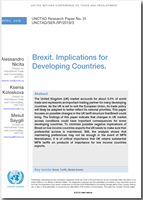
The United Kingdom (UK) market accounts for about 3.5% of world trade and represents an important trading partner for many developing countries.
As the UK is set to exit the European Union, its trade policy will likely be adapted to better reflect its national priorities.
This paper focuses on possible changes in the UK tariff structure that Brexit could bring. The findings of this paper indicate that changes in UK market access conditions could have important consequences for some developing countries.
To minimize possible negative implications of Brexit on low income countries exports the UK needs to make sure that preferential access is maintained. Still, the analysis shows that maintaining preferences may not be enough in the event of MFN liberalization.
It is of critical importance that UK retains substantial MFN tariffs on products of importance for low income countries exports.


